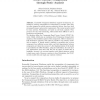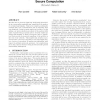14 search results - page 2 / 3 » Composition Does Not Imply Adaptive Security |
SP
2006
IEEE
14 years 3 months ago
2006
IEEE
Simulatable security is a security notion for multi-party protocols that implies strong composability features. The main definitional flavours of simulatable security are standa...
EUROCRYPT
2010
Springer
14 years 2 months ago
2010
Springer
Imagine many small devices send data to a single receiver, encrypted using the receiver’s public key. Assume an adversary that has the power to adaptively corrupt a subset of the...
SOCO
2008
Springer
13 years 9 months ago
2008
Springer
Abstract. Extensible Component Platforms support the discovery, installation, starting, uninstallation of components at runtime. Since they are often targeted at mobile resource-co...
STOC
2002
ACM
14 years 10 months ago
2002
ACM
d Abstract) Ran Canetti Yehuda Lindell Rafail Ostrovsky Amit Sahai? We show how to securely realize any multi-party functionality in a universally composable way, regardless of th...
JCS
2010
13 years 8 months ago
2010
Protocol authentication properties are generally trace-based, meaning that authentication holds for the protocol if authentication holds for individual traces (runs of the protoco...


